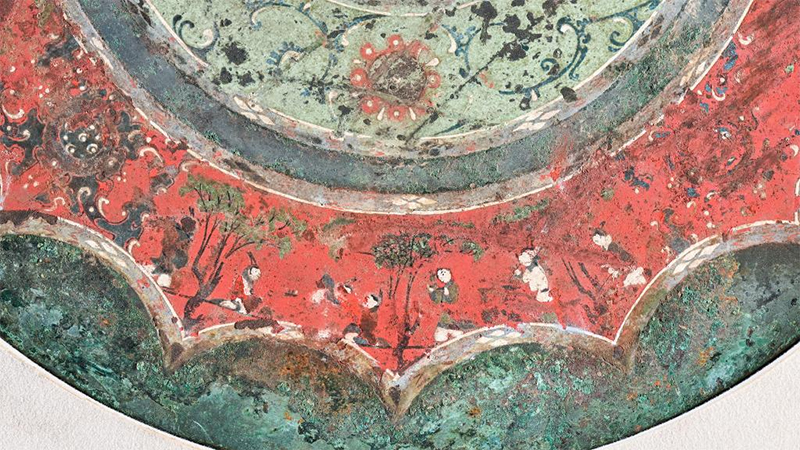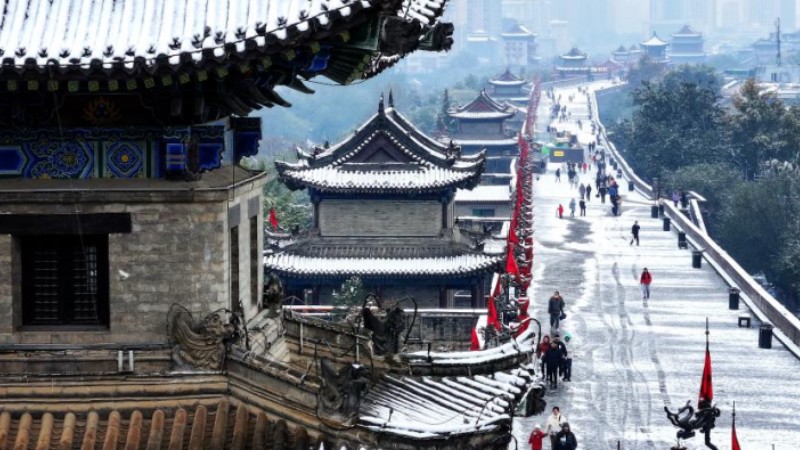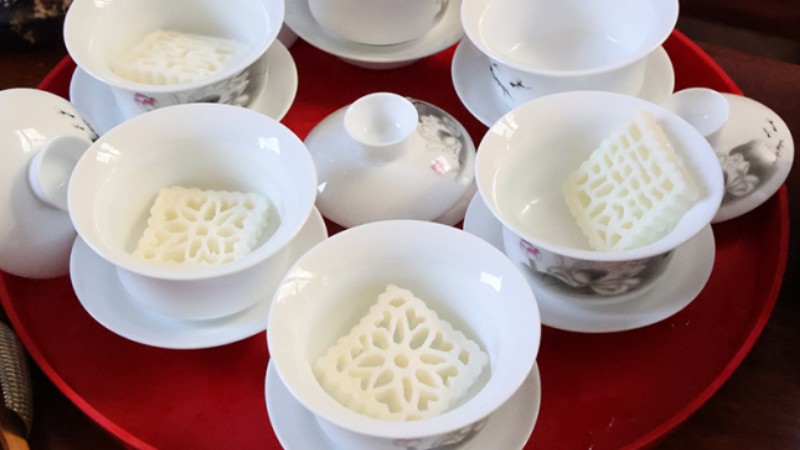Family celebrates Gongbo New Year in Suosong Village, Xizang
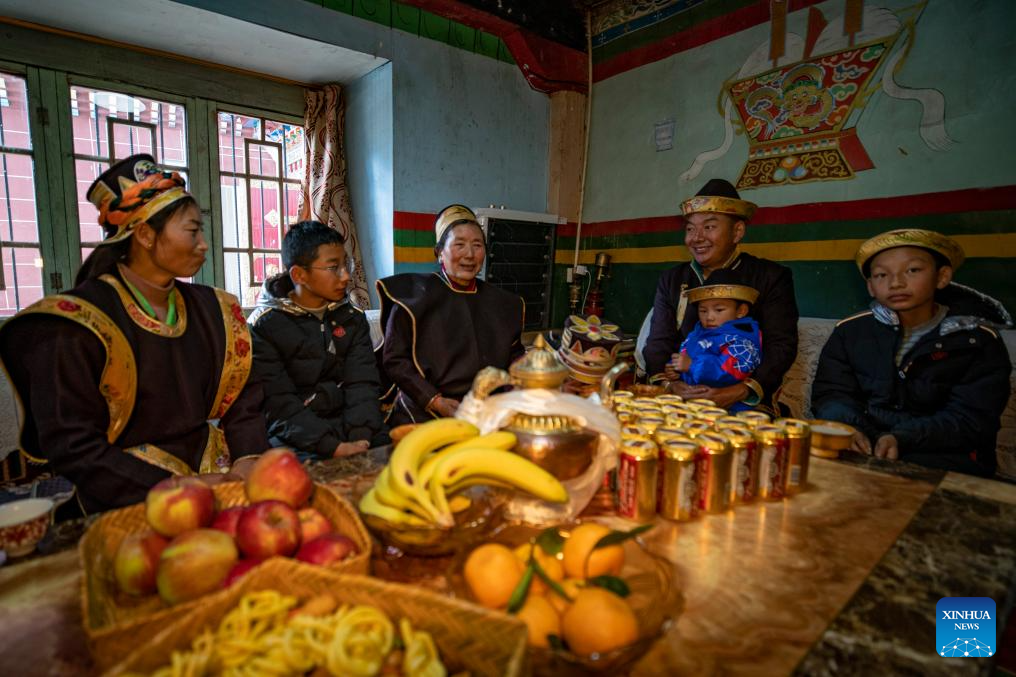
Tsering Toinzhub (2nd R) and Lhagba Zhoima (1st L) drink buttered tea with their family in Suosong Village of Nyingchi, southwest China's Xizang Autonomous Region, Nov. 14, 2023.
Locals in Nyingchi follow the tradition to celebrate their special New Year, known as the Gongbo New Year, on Oct. 1 by the Tibetan calendar, which fell on Nov. 14 this year. Tsering Toinzhub and Lhagba Zhoima have run a homestay since 2013, bringing in more than one million yuan (about 137,187 U.S. dollars) every year. For their family, the traditional Gongbo New Year is still the most important festival. (Xinhua/Jiang Fan)
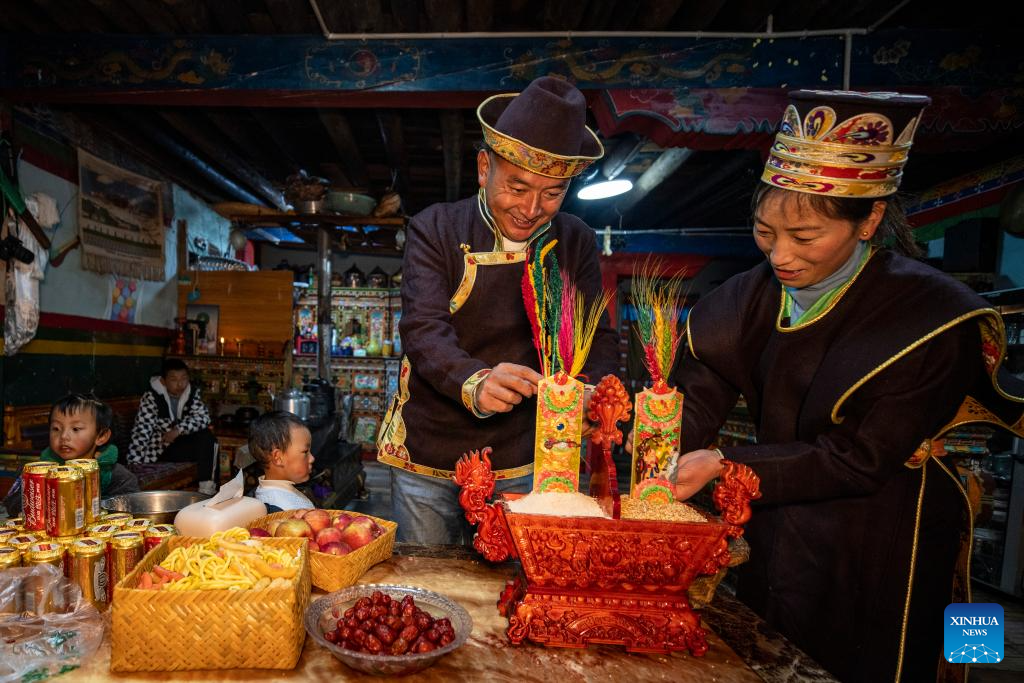
Tsering Toinzhub (L) and Lhagba Zhoima prepare chema, a two-tier rectangular wooden box containing roasted barley and fried wheat grain, in Suosong Village of Nyingchi, southwest China's Xizang Autonomous Region, Nov. 13, 2023.
Locals in Nyingchi follow the tradition to celebrate their special New Year, known as the Gongbo New Year, on Oct. 1 by the Tibetan calendar, which fell on Nov. 14 this year. Tsering Toinzhub and Lhagba Zhoima have run a homestay since 2013, bringing in more than one million yuan (about 137,187 U.S. dollars) every year. For their family, the traditional Gongbo New Year is still the most important festival. (Xinhua/Jiang Fan)
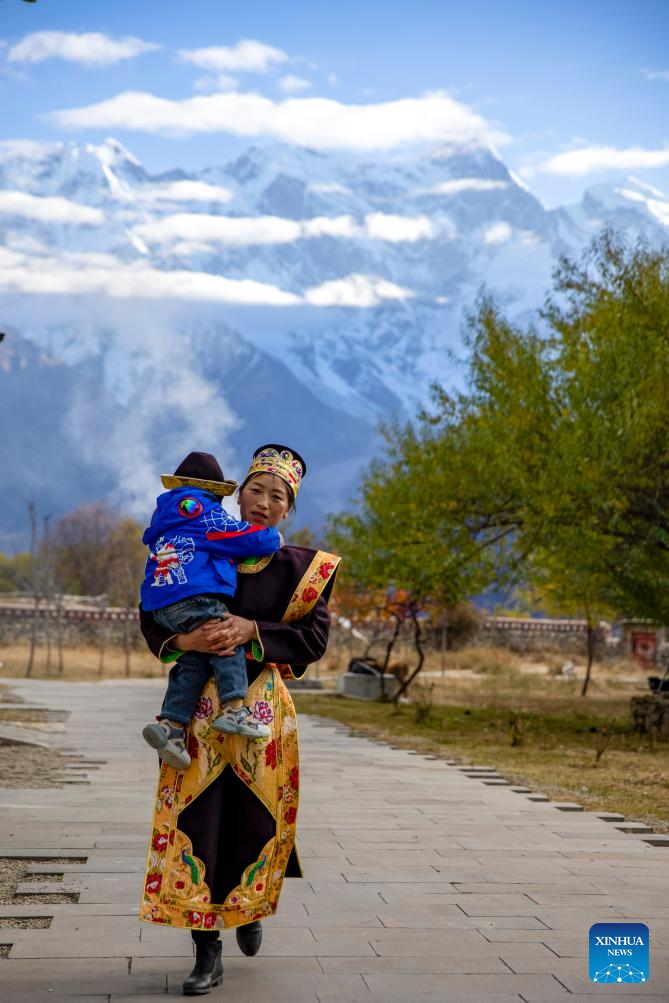
Lhagba Zhoima is pictured in Suosong Village of Nyingchi, southwest China's Xizang Autonomous Region, Nov. 14, 2023.
Locals in Nyingchi follow the tradition to celebrate their special New Year, known as the Gongbo New Year, on Oct. 1 by the Tibetan calendar, which fell on Nov. 14 this year. Tsering Toinzhub and Lhagba Zhoima have run a homestay since 2013, bringing in more than one million yuan (about 137,187 U.S. dollars) every year. For their family, the traditional Gongbo New Year is still the most important festival. (Xinhua/Huang Yaoman)
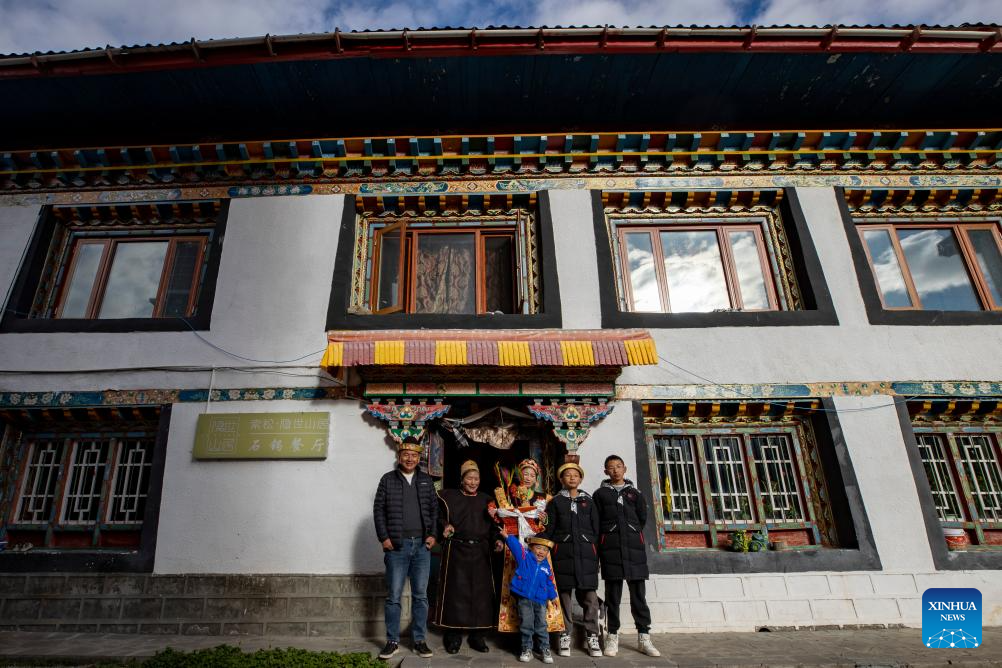
Tsering Toinzhub (1st L) and Lhagba Zhoima (3rd L) pose for a photo with their family in Suosong Village of Nyingchi, southwest China's Xizang Autonomous Region, Nov. 14, 2023.
Locals in Nyingchi follow the tradition to celebrate their special New Year, known as the Gongbo New Year, on Oct. 1 by the Tibetan calendar, which fell on Nov. 14 this year. Tsering Toinzhub and Lhagba Zhoima have run a homestay since 2013, bringing in more than one million yuan (about 137,187 U.S. dollars) every year. For their family, the traditional Gongbo New Year is still the most important festival. (Xinhua/Huang Yaoman)

Lhagba Zhoima (1st R) feeds cattle in Suosong Village of Nyingchi, southwest China's Xizang Autonomous Region, Nov. 14, 2023.
Locals in Nyingchi follow the tradition to celebrate their special New Year, known as the Gongbo New Year, on Oct. 1 by the Tibetan calendar, which fell on Nov. 14 this year. Tsering Toinzhub and Lhagba Zhoima have run a homestay since 2013, bringing in more than one million yuan (about 137,187 U.S. dollars) every year. For their family, the traditional Gongbo New Year is still the most important festival. (Xinhua/Tenzin Nyida)
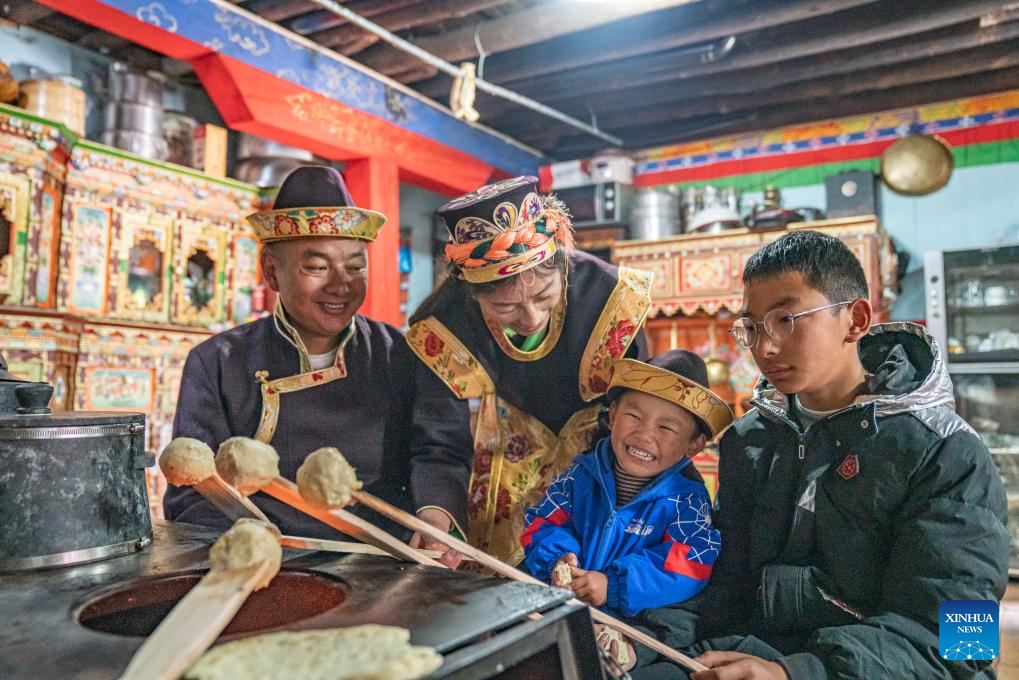
Tsering Toinzhub (1st L) and Lhagba Zhoima (2nd L) enjoy traditional food with their family in Suosong Village of Nyingchi, southwest China's Xizang Autonomous Region, Nov. 14, 2023.
Locals in Nyingchi follow the tradition to celebrate their special New Year, known as the Gongbo New Year, on Oct. 1 by the Tibetan calendar, which fell on Nov. 14 this year. Tsering Toinzhub and Lhagba Zhoima have run a homestay since 2013, bringing in more than one million yuan (about 137,187 U.S. dollars) every year. For their family, the traditional Gongbo New Year is still the most important festival. (Xinhua/Tenzin Nyida)
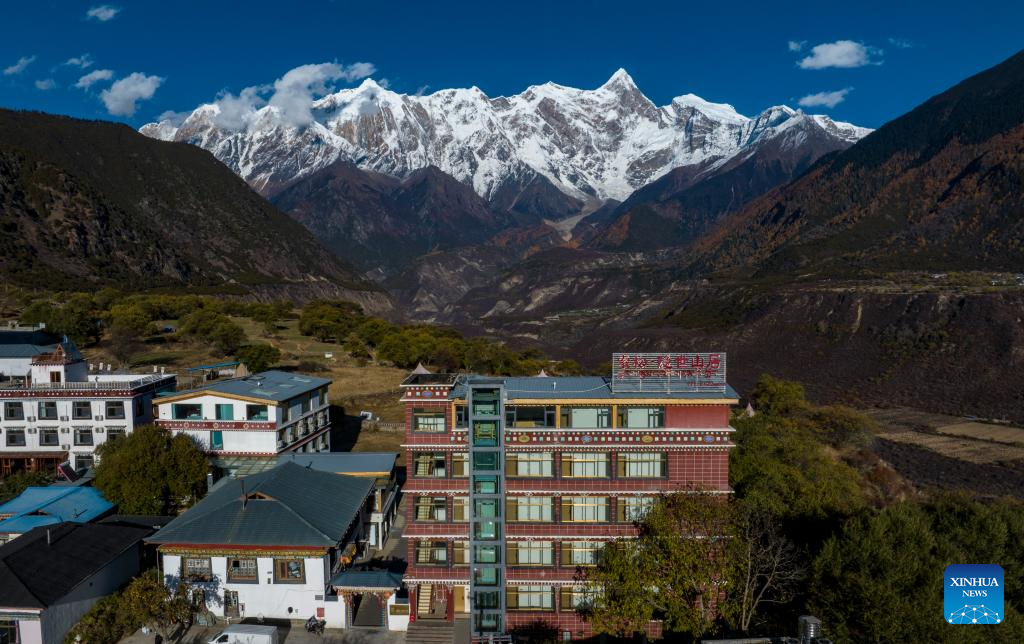
This aerial photo taken on Nov. 13, 2023 shows a homestay run by Tsering Toinzhub and Lhagba Zhoima in Suosong Village of Nyingchi, southwest China's Xizang Autonomous Region.
Locals in Nyingchi follow the tradition to celebrate their special New Year, known as the Gongbo New Year, on Oct. 1 by the Tibetan calendar, which fell on Nov. 14 this year. Tsering Toinzhub and Lhagba Zhoima have run a homestay since 2013, bringing in more than one million yuan (about 137,187 U.S. dollars) every year. For their family, the traditional Gongbo New Year is still the most important festival. (Xinhua/Jiang Fan)
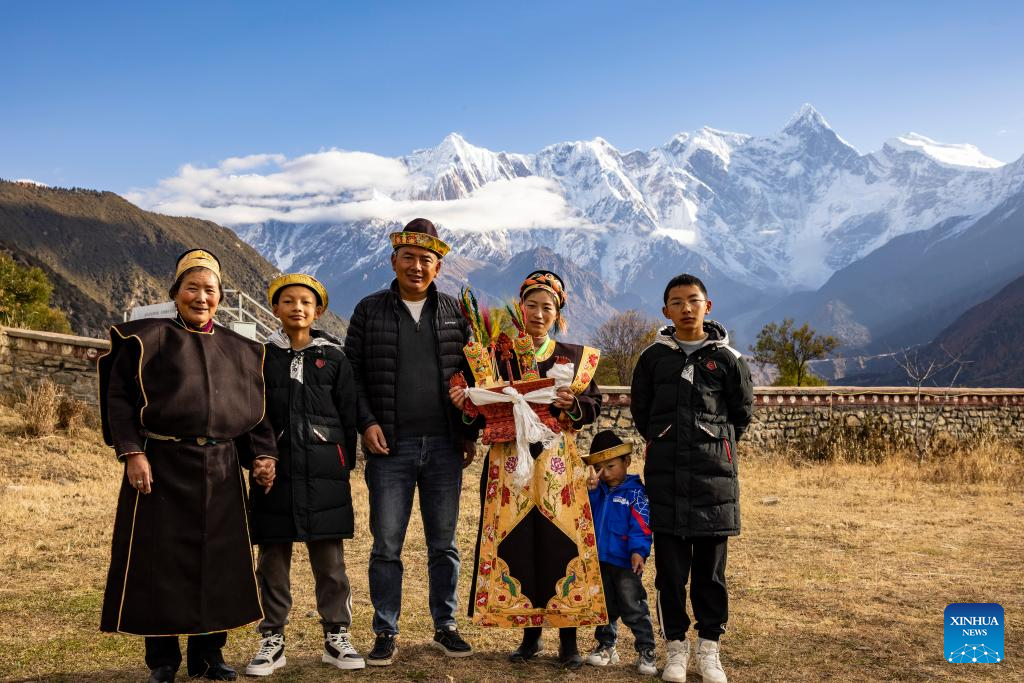
Tsering Toinzhub (3rd L) and Lhagba Zhoima (4th L) pose for a photo with their family in Suosong Village of Nyingchi, southwest China's Xizang Autonomous Region, Nov. 14, 2023.
Locals in Nyingchi follow the tradition to celebrate their special New Year, known as the Gongbo New Year, on Oct. 1 by the Tibetan calendar, which fell on Nov. 14 this year. Tsering Toinzhub and Lhagba Zhoima have run a homestay since 2013, bringing in more than one million yuan (about 137,187 U.S. dollars) every year. For their family, the traditional Gongbo New Year is still the most important festival. (Xinhua/Jiang Fan)
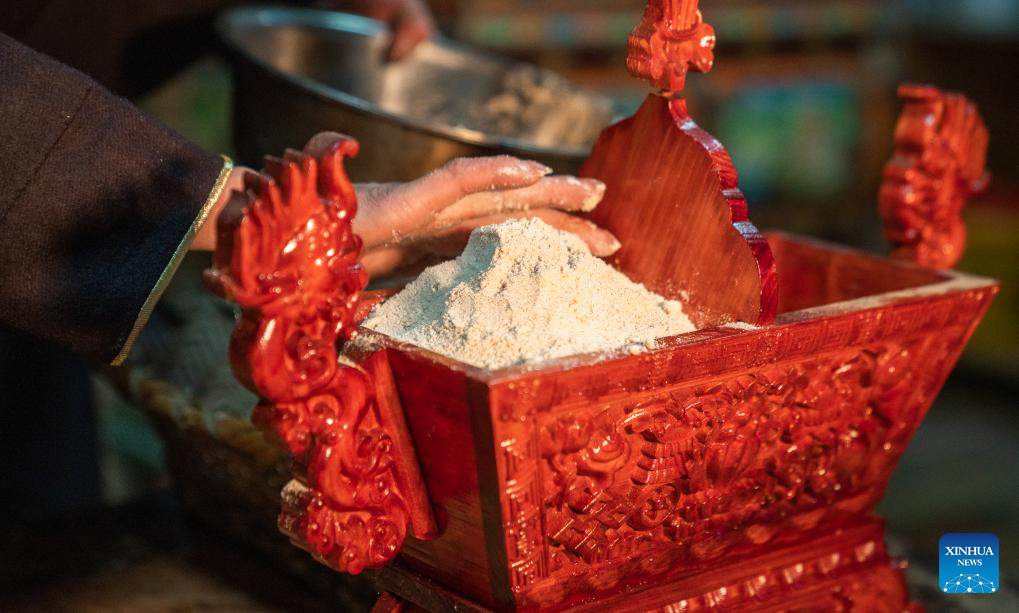
Lhagba Zhoima prepares chema, a two-tier rectangular wooden box containing roasted barley and fried wheat grain, in Suosong Village of Nyingchi, southwest China's Xizang Autonomous Region, Nov. 13, 2023.
Locals in Nyingchi follow the tradition to celebrate their special New Year, known as the Gongbo New Year, on Oct. 1 by the Tibetan calendar, which fell on Nov. 14 this year. Tsering Toinzhub and Lhagba Zhoima have run a homestay since 2013, bringing in more than one million yuan (about 137,187 U.S. dollars) every year. For their family, the traditional Gongbo New Year is still the most important festival. (Xinhua/Tenzin Nyida)
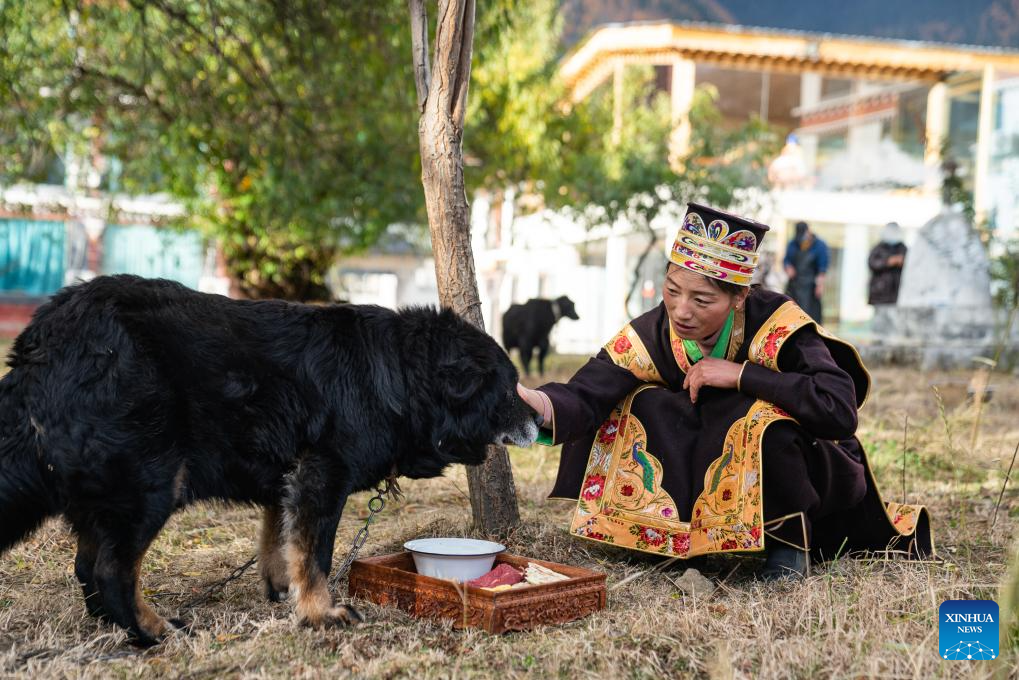
Lhagba Zhoima feeds a dog in Suosong Village of Nyingchi, southwest China's Xizang Autonomous Region, Nov. 14, 2023.
Locals in Nyingchi follow the tradition to celebrate their special New Year, known as the Gongbo New Year, on Oct. 1 by the Tibetan calendar, which fell on Nov. 14 this year. Tsering Toinzhub and Lhagba Zhoima have run a homestay since 2013, bringing in more than one million yuan (about 137,187 U.S. dollars) every year. For their family, the traditional Gongbo New Year is still the most important festival. (Xinhua/Tenzin Nyida)
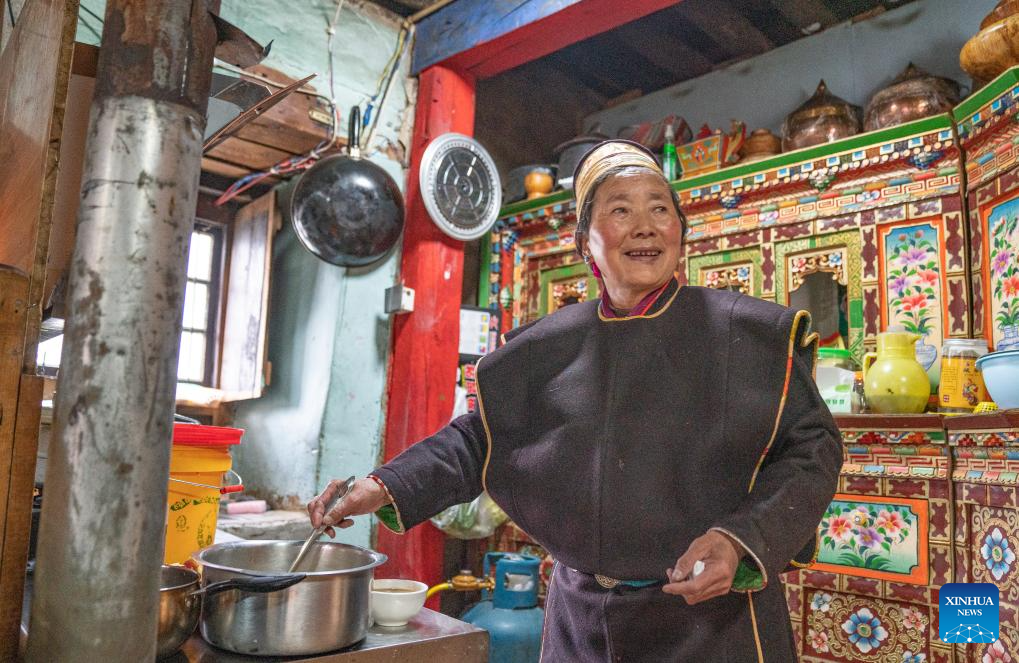
Tsering Toinzhub's mother checks highland barley wine in Suosong Village of Nyingchi, southwest China's Xizang Autonomous Region, Nov. 14, 2023.
Locals in Nyingchi follow the tradition to celebrate their special New Year, known as the Gongbo New Year, on Oct. 1 by the Tibetan calendar, which fell on Nov. 14 this year. Tsering Toinzhub and Lhagba Zhoima have run a homestay since 2013, bringing in more than one million yuan (about 137,187 U.S. dollars) every year. For their family, the traditional Gongbo New Year is still the most important festival. (Xinhua/Tenzin Nyida)
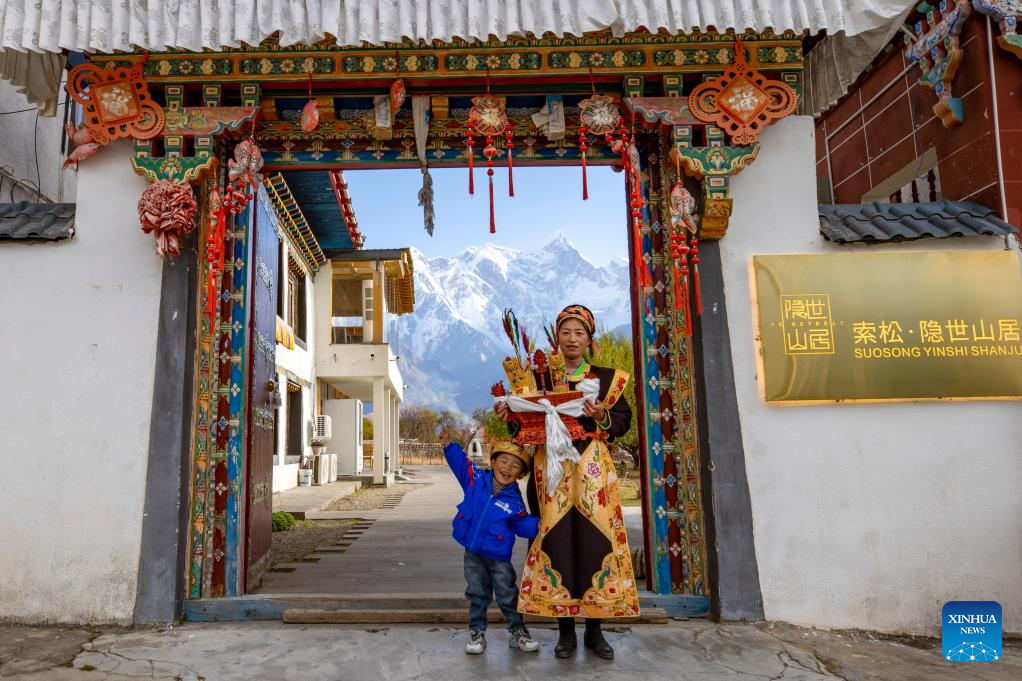
Lhagba Zhoima and her son pose for a photo with chema, a two-tier rectangular wooden box containing roasted barley and fried wheat grain, in front of their house in Suosong Village of Nyingchi, southwest China's Xizang Autonomous Region, Nov. 14, 2023.
Locals in Nyingchi follow the tradition to celebrate their special New Year, known as the Gongbo New Year, on Oct. 1 by the Tibetan calendar, which fell on Nov. 14 this year. Tsering Toinzhub and Lhagba Zhoima have run a homestay since 2013, bringing in more than one million yuan (about 137,187 U.S. dollars) every year. For their family, the traditional Gongbo New Year is still the most important festival. (Xinhua/Jiang Fan)
Photos
Related Stories
- Inheritor dedicated to passing on ancient Pusum hand-engraving in SW China's Xizang
- Spectacular landscapes along Xizang section of China's longest national highway
- Xizang schools visits, interviews debunk "forced assimilation" claims
- Housing project improves grassland life at winter pastures in Xizang
- New land port linking China's Xizang with Nepal opens
Copyright © 2023 People's Daily Online. All Rights Reserved.






